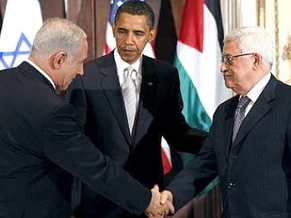|
World Jewish News

Benjamin Netanyahu, Barack Obama, and Mahmoud Abbas in New York in September 2009. Photo by: Reuters
|
Abbas unlikely to agree to direct talks soon, say Ramallah sources
16.07.2010, Israel Palestinian President Mahmoud Abbas is averse to resuming direct Middle East talks in the near future despite the Obama administration's "strong belief" that such negotiations could begin within days or weeks, Israel Radio reported on Friday, citing sources in Ramallah.
U.S. envoy George Mitchell was in the region this week, shuttling between Ramallah and Jerusalem for separate rounds of talks with Abbas and Prime Minister Benjamin Netanyahu. Mitchell has been moderating the proximity talks between the two sides for the last two months. When asked when the U.S. envisioned the direct process could begin, State Department spokesman P.J. Crowley said: "This is a decision that is first and foremost up to Israeli and Palestinian leaders… I think we have a strong belief that at some point in time, direct negotiations will be renewed. Whether that's days from now, weeks from now, I don't think we're in a position to say at this point."
Mitchell met with Netanyahu on Friday in Jerusalem and will head to Ramallah on Saturday for talks with Abbas and Palestinian Prime Minister Salam Fayyad.
Abbas' Fatah party said on Thursday there should be no move to face-to-face Middle East peace talks sought by the United States without progress in the indirect talks it is mediating.
The Palestinian leader is facing pressure from Washington to agree to direct negotiations with Netanyahu - who says he is ready to start talks with the Palestinian leader right away.
But Abbas is wary of negotiating directly with an Israeli leader he believes unwilling to settle the Middle East conflict on terms acceptable to the Palestinians.
The Fatah statement, which criticized calls for a move to direct negotiations, illustrated the domestic pressure Abbas is facing to resist more direct peace talks with Israel.
The Palestinian leader has been a central figure in years of fruitless diplomacy aimed at negotiating the creation of a Palestinian state alongside Israel.
Fatah blamed a "lack of credibility" on the part of Israel for a lack of progress in the indirect talks.
The Israeli approach would "cement itslf ... if there is a move to direct negotiations", the Fatah statement said, urging Palestinians to rally around the leadership.
Abbas says the indirect talks should make progress towards agreement on the borders of the state the Palestinians aim to establish alongside Israel on land it captured in the 1967 Six-Day War and security arrangements for the "two-state solution".
In a speech last Saturday, he also said Israel must halt building settlements on occupied land. But he did not repeat his demand for a full settlement halt as a condition for direct talks with Netanyahu.
Netanyahu has said he is willing to discuss right away the future of Jewish settlements if the Palestinians enter direct talks.
George Giacaman, a political scientist at Birzeit University in the West Bank, said the pressure on Abbas to resume direct talks with Israel would be "immense".
"The main issue is how to go back to direct negotiations without completely losing face," he said. "I don't know that a return to direct talks is inevitable."
Haaretz.com
|
|
